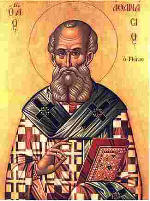
The Paradise Of The Holy Fathers Volumes 1 and 2 by Saint Athanasius Of Alexandria
CHAPTER XXI
OF THE BLESSED MAN STEPHEN
STEPHEN was a man who was by race of the Libyans who [dwell by] the side of Marmarica and Mareotis, and he lived there for sixty years. Now in another codex [the text readeth] differently, thus: There was also in the desert a certain blessed man whose name was Stephen, and he was by race a Libyan from the border (or side) of Marmarica; and he dwelt there in the desert for sixty years. And having attained unto the heights of a perfect rule of life, he was esteemed [by Divine Grace] worthy of the gift of discerning prudence and of the faculty of giving consolation to such an extent that whosoever drew nigh unto him, being afflicted in any way whatsoever, departed from him with joy. Now the blessed Anthony was acquainted with this man. And this Stephen continued in this life even unto our own days, but I never lived with him and I never met him, because the mountain [wherein he dwelt] was a long way off from me. The holy men Ammonius and Evagrius, however, who went to visit him related unto me stories concerning him, and they said, “Having gone to him we found him grievously sick of a certain sore sickness which had come upon him, for a cancerous sore had broken out in the lower parts of his body; now this sore is called ‘gangrene,’ and we found him being cut by a certain physician. Nevertheless the holy man was working with his hands and was plaiting [palm] leaves, and he held converse with us whilst portions of his body were being cut off. And he possessed the faculty of patient endurance to such a degree that it seemed as if the body of some one else was being cut instead of his own; now when his members had been shorn off like hair he continued, through the grace of God, to be without perception thereof. And whilst the physician was binding him up he sat still and plaited baskets with his hands, and he conversed with us, rejoicing and giving thanks unto God. And moreover, he displayed such patient endurance whilst his member was being cut off that one might have thought that it had not been cut off at all, and he resembled altogether a man from whose body threads of hair are being plucked. Now we stood there and marvelled at this affliction, for we could not bear to see the man who had led a life of such ascetic and spiritual excellences fall into such a state of suffering that at length amputation of his members was necessary. And the blessed man, having perceived our thoughts and seen that it grieved us, answered and said unto us, ‘O my sons, be not ye afflicted concerning this matter, and do not lessen your faith because of this thing, for God never performeth anything whatsoever that is evil, on the contrary, He looketh for a happy conclusion [to His work]. Oh, how many were the times when these members were condemned to punishment! For they merited being cut off, and it is better that they should receive their reward here than after their departure out of this world.’ These were the things which he spake unto us, and he comforted us and sent us away, saying, ‘Be not ye scandalized when ye see trials of this kind coming upon holy men, for by such God hath built us up and comforted us, and hath made us to be confirmed in the laws which are against tribulations.’ ” I have related these things in order that we may not wonder when we see the saints falling into tribulations.
A Preface concerning those who have fallen into the Errors of Sins
IT is very necessary, O my brethren, that we should also keep in memory the histories which concern the life and deeds of those who have tripped up and fallen as an excellent admonition of those who come across this book (just as among the trees that were in Paradise the Tree of Good and Evil was also found), so that if it happen that certain men lead good lives through the Grace and help of God, Who is wont to help those whose motive of soul is [directed] straight to the mark, they may not be exalted overmuch and have pride in their works of ascetic excellence. For on many occasions this very excellence itself hath been the cause of a fall when it hath not been made perfect by means of a correct motive, for it is written, “I have seen the righteous man who hath perished in his righteousness, which also is vanity” (Ecclesiasticus 7:15).
Copyright ©1999-2023 Wildfire Fellowship, Inc all rights reserved

 Keep Site Running
Keep Site Running